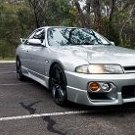Rb25det Problems..
Announcements
-
Similar Content
-
Latest Posts
-
First up, I wouldn't use PID straight up for boost control. There's also other control techniques that can be implemented. And as I said, and you keep missing the point. It's not the ONE thing, it's the wrapping it up together with everything else in the one system that starts to unravel the problem. It's why there are people who can work in a certain field as a generalist, IE a IT person, and then there are specialists. IE, an SQL database specialist. Sure the IT person can build and run a database, and it'll work, however theyll likely never be as good as a specialist. So, as said, it's not as simple as you're thinking. And yes, there's a limit to the number of everything's in MCUs, and they run out far to freaking fast when you're designing a complex system, which means you have to make compromises. Add to that, you'll have a limited team working on it, so fixing / tweaking some features means some features are a higher priority than others. Add to that, someone might fix a problem around a certain unrelated feature, and that change due to other complexities in the system design, can now cause a new, unforseen bug in something else. The whole thing is, as said, sometimes split systems can work as good, and if not better. Plus when there's no need to spend $4k on an all in one solution, to meet the needs of a $200 system, maybe don't just spout off things others have said / you've read. There's a lot of misinformation on the internet, including in translated service manuals, and data sheets. Going and doing, so that you know, is better than stating something you read. Stating something that has been read, is about as useful as an engineering graduate, as all they know is what they've read. And trust me, nearly every engineering graduate is useless in the real world. And add to that, if you don't know this stuff, and just have an opinion, maybe accept what people with experience are telling you as information, and don't keep reciting the exact same thing over and over in response.
-
By joshuaho96 · Posted
How complicated is PID boost control? To me it really doesn't seem that difficult. I'm not disputing the core assertion (specialization can be better than general purpose solutions), I'm just saying we're 30+ years removed from the days when transistor budgets were in the thousands and we had to hem and haw about whether there's enough ECC DRAM or enough clock cycles or the interrupt handler can respond fast enough to handle another task. I really struggle to see how a Greddy Profec or an HKS EVC7 or whatever else is somehow a far superior solution to what you get in a Haltech Nexus/Elite ECU. I don't see OEMs spending time on dedicated boost control modules in any car I've ever touched. Is there value to separating out a motor controller or engine controller vs an infotainment module? Of course, those are two completely different tasks with highly divergent requirements. The reason why I cite data sheets, service manuals, etc is because as you have clearly suggested I don't know what I'm doing, can't learn how to do anything correctly, and have never actually done anything myself. So when I do offer advice to people I like to use sources that are not just based off of taking my word for it and can be independently verified by others so it's not just my misinterpretation of a primary source. -
That's awesome, well done! Love all these older Datsun / Nissans so rare now
-
As I said, there's trade offs to jamming EVERYTHING in. Timing, resources etc, being the huge ones. Calling out the factory ECU has nothing to do with it, as it doesn't do any form of fancy boost control. It's all open loop boost control. You mention the Haltech Nexus, that's effectively two separate devices jammed into one box. What you quote about it, is proof for that. So now you've lost flexibility as a product too... A product designed to do one thing really well, will always beat other products doing multiple things. Also, I wouldn't knock COTS stuff, you'd be surprised how many things are using it, that you're probably totally in love with As for the SpaceX comment that we're working directly with them, it's about the type of stuff we're doing. We're doing design work, and breaking world firsts. If you can't understand that I have real world hands on experience, including in very modern tech, and actually understand this stuff, then to avoid useless debates where you just won't accept fact and experience, from here on, it seems you'd be be happy I (and possibly anyone with knowledge really) not reply to your questions, or input, no matter how much help you could be given to help you, or let you learn. It seems you're happy reading your data sheets, factory service manuals, and only want people to reinforce your thoughts and points of view.
-
By joshuaho96 · Posted
I don't really understand because clearly it's possible. The factory ECU is running on like a 4 MHz 16-bit processor. Modern GDI ECUs have like 200 MHz superscalar cores with floating point units too. The Haltech Nexus has two 240 MHz CPU cores. The Elite 2500 is a single 80 MHz core. Surely 20x the compute means adding some PID boost control logic isn't that complicated. I'm not saying clock speed is everything, but the requirements to add boost control to a port injection 6 cylinder ECU are really not that difficult. More I/O, more interrupt handlers, more working memory, etc isn't that crazy to figure out. SpaceX if anything shows just how far you can get arguably doing things the "wrong" way, ie x86 COTS running C++ on Linux. That is about as far away from the "correct" architecture as it gets for a real time system, but it works anyways.
-







Recommended Posts
Create an account or sign in to comment
You need to be a member in order to leave a comment
Create an account
Sign up for a new account in our community. It's easy!
Register a new accountSign in
Already have an account? Sign in here.
Sign In Now